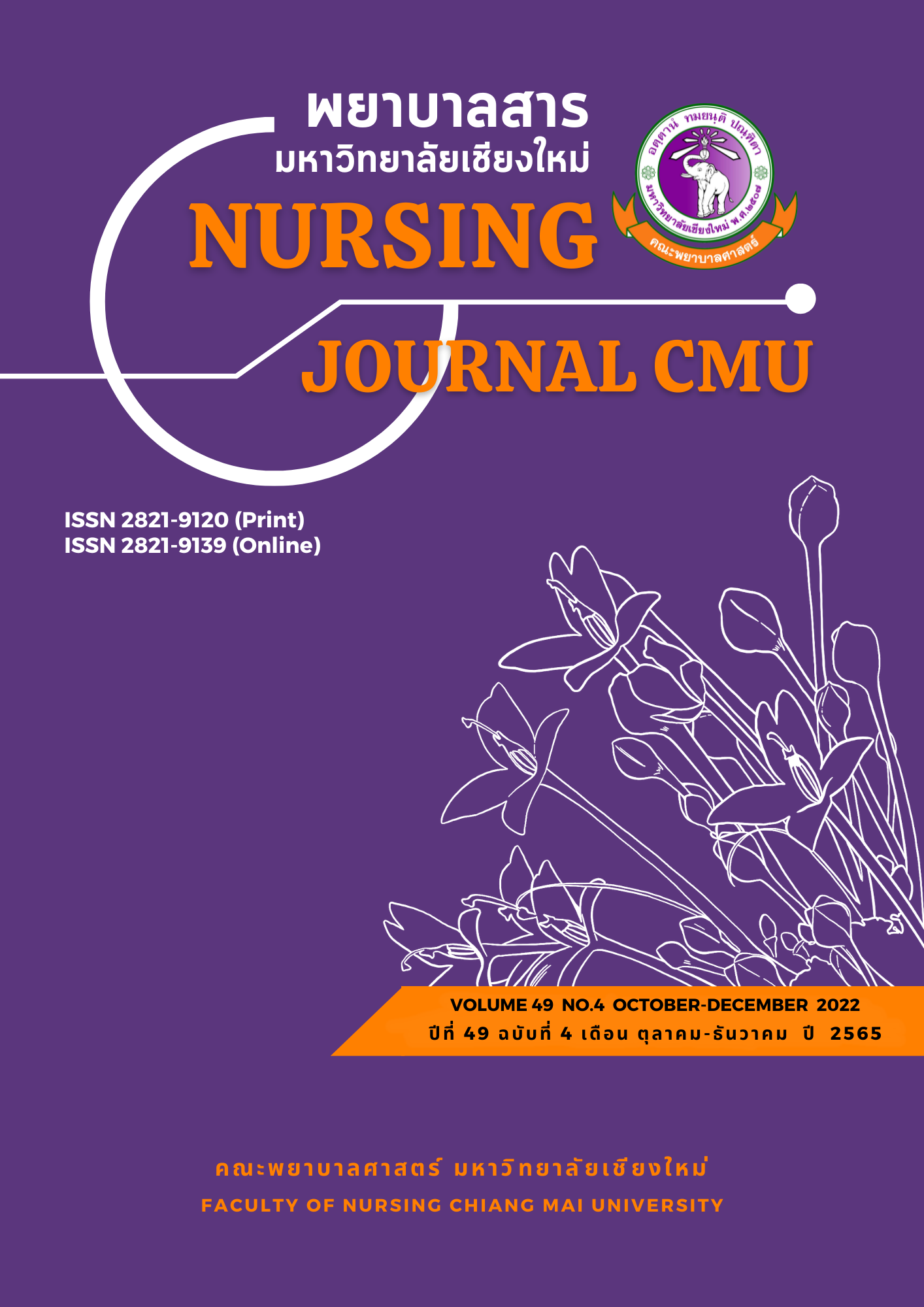Experiences of Returning to School during Chemotherapy of Adolescents with Cancer
Keywords:
Getting back to school, Experience, Adolescent patients with cancerAbstract
Husserlian Phenomenology was applied as the principle for this qualitative research. The purpose of this study was to describe the illness experience of adolescent patients with cancer. The key informants were adolescent cancer patients aged 12-18 years who were undergoing chemotherapy at five tertiary hospitals according to the inclusion criteria. Data were collected through in-depth interviews with nine key informants and analyzed using Colaizzi’s method until the data was saturated.
The results presented nine key informants, aged 12-16 years, including 8 patients with acute leukemia, and 1 lymphoma patient. These informants defined the experience of returning to school during chemotherapy into five themes; 1) getting back to school for myself, 2) getting back to school, but not the same, 3) getting help from the people around me, 4) being encouraged to stay, and 5) being happy about going back to school.
The results of this research could enhance a better understanding of the experience of adolescents with cancer returning to school during chemotherapy, and the research data can be used as fundamental data to support adolescents with cancer, who are ready, determined, and want to return to school, to be successful. Future research is recom- mended on related topics.
References
Adamson, P. C., Bagatell, R., Balis, F. M., & Blaney, S. M. (2011). General principles of chemotherapy. In P. A. Pizzo, & D. G. Pollack (Eds.), Principles and practice of pediatric oncology (6th ed.). Philadelphia: Lippincott Williams and Wilkins.
Brimeyer, C., Northup, J., & McCarthy, A. (2012). The adolescent with cancer's school re-entry experience: Exploration of predictors and successful outcomes (Doctoral dissertation). University of Iowa. USA.
Choquette, A., Rennick, J. E., & Lee, V. (2016). Back to school after cancer treatment: Making sense of the adolescent experience. Cancer Nursing, 39(5), 393-401.
Drillings, J., & Schilling, E. (2016). The school reentry process in North Carolina schools for children with pediatric cancer (Graduate School, Specialist in School Psychology). University of Western Carolina. USA.
Gesell, A. (2021). Child development. New Delhi: Prabhat Prakashan.
Greene, S., & Hogan, D. (2005). Researching children′ s experience: Approaches and methods. California; Sage.
Klerlhee, T., Wiroonpanich, W., & Punthmatharith, B. (2018). Spiritual well-being experience of adolescents with cancer. The Southern College Network Journal of Nursing and Public Health, 5(2), 102-118. (in Thai)
Morrow, R., Rodriguez, A., & King, N. (2015). Colaizzi’s descriptive phenomenological method. The Psychologist, 28(8), 643-644.
Pharnit, J., & Chaiyawat, W. (2007). Illness experience of school age patients with leukemia. Thai Journal of Nursing Council, 22(3), 40-50. (in Thai)
Pini, S., Gardner, P., & Hugh-Jones, S. (2016). How teenagers continue school after a diagnosis of cancer: Experiences of young people and recommendations for practice. Future Oncology, 12(24), 2785-2800.
Rodgers, C. C. (2015). The child with cancer. In M. J. Hockenberry, & D. Wilson (Eds.), Wong's nursing care of infants and children (10th ed.). St Louis: Elsevier Health Sciences.
Sandeberg, A. M., Johansson, E., Bjork, O., & Wettergren, L. (2008). Health-related quality of life relates to school attendance in children on treatment for cancer. Journal of Pediatric Oncology Nursing, 25(5), 265-274.
Thaiware. (2015). FreeMind (free mind map creator). Retrieved from https://software.thaiware.com/download.php?id=2664
Thompson, A. L., Christiansen, H. L., Elam, M., Hoag, J., Irwin, M. K., Pao, M., ... Kelly, K. P. (2015). Academic continuity and school reentry support as a standard of care in pediatric oncology. Pediatric Blood & Cancer, 62(S5), 805-817.
Treenai, S., & Chaiyawat, W. (2006). Illness experience of adolescent patients with leukemia. Thai Journal of Nursing Council, 21(3), 47-60. (in Thai)
Treenai, S., Chaiyawat, W., & Yunibhand, J. (2013). Returning to normality among adolescents with leukemia receiving chemotherapy (Doctoral dissertation). Chulalongkorn University. Thailand.
Treenai, S., Chaiyawat, W., & Yunibhand, J. (2015). Realizing being a leukemic patient: The starting point of returning to normality in Thai adolescents. Journal of Health Research, 29(1), 7-13. (in Thai)
Tsimicalis, A., Genest, L., Stevens, B., Ungar, W. J., & Barr, R. (2018). The impact of a childhood cancer diagnosis on the children and siblings’ school attendance, performance, and activities: A qualitative descriptive study. Journal of Pediatric Oncology Nursing, 35(2), 118-131.
Williamson, H., Harcourt, D., Halliwell, E., Frith, H., & Wallace, M. (2010). Adolescents’ and parents’ experiences of managing the psychosocial impact of appearance change during cancer treatment. Journal of Pediatric Oncology Nursing, 27(3), 168-175.
Zahavi, D. (2003). Husserl's phenomenology. California: Stanford University Press.
Downloads
Published
How to Cite
Issue
Section
License
Copyright (c) 2022 Nursing Journal

This work is licensed under a Creative Commons Attribution-NonCommercial-NoDerivatives 4.0 International License.
บทความที่ได้รับการตีพิมพ์เป็นลิขสิทธิ์ของวารสารพยาบาลสาร
ข้อความที่ปรากฏในบทความแต่ละเรื่องในวารสารวิชาการเล่มนี้เป็นความคิดเห็นส่วนตัวของผู้เขียนแต่ละท่านไม่เกี่ยวข้องกับมหาวิทยาลัยเชียงใหม่ และคณาจารย์ท่านอื่นๆในมหาวิทยาลัยฯ แต่อย่างใด ความรับผิดชอบองค์ประกอบทั้งหมดของบทความแต่ละเรื่องเป็นของผู้เขียนแต่ละท่าน หากมีความผิดพลาดใด ๆ ผู้เขียนแต่ละท่านจะรับผิดชอบบทความของตนเองแต่ผู้เดียว






